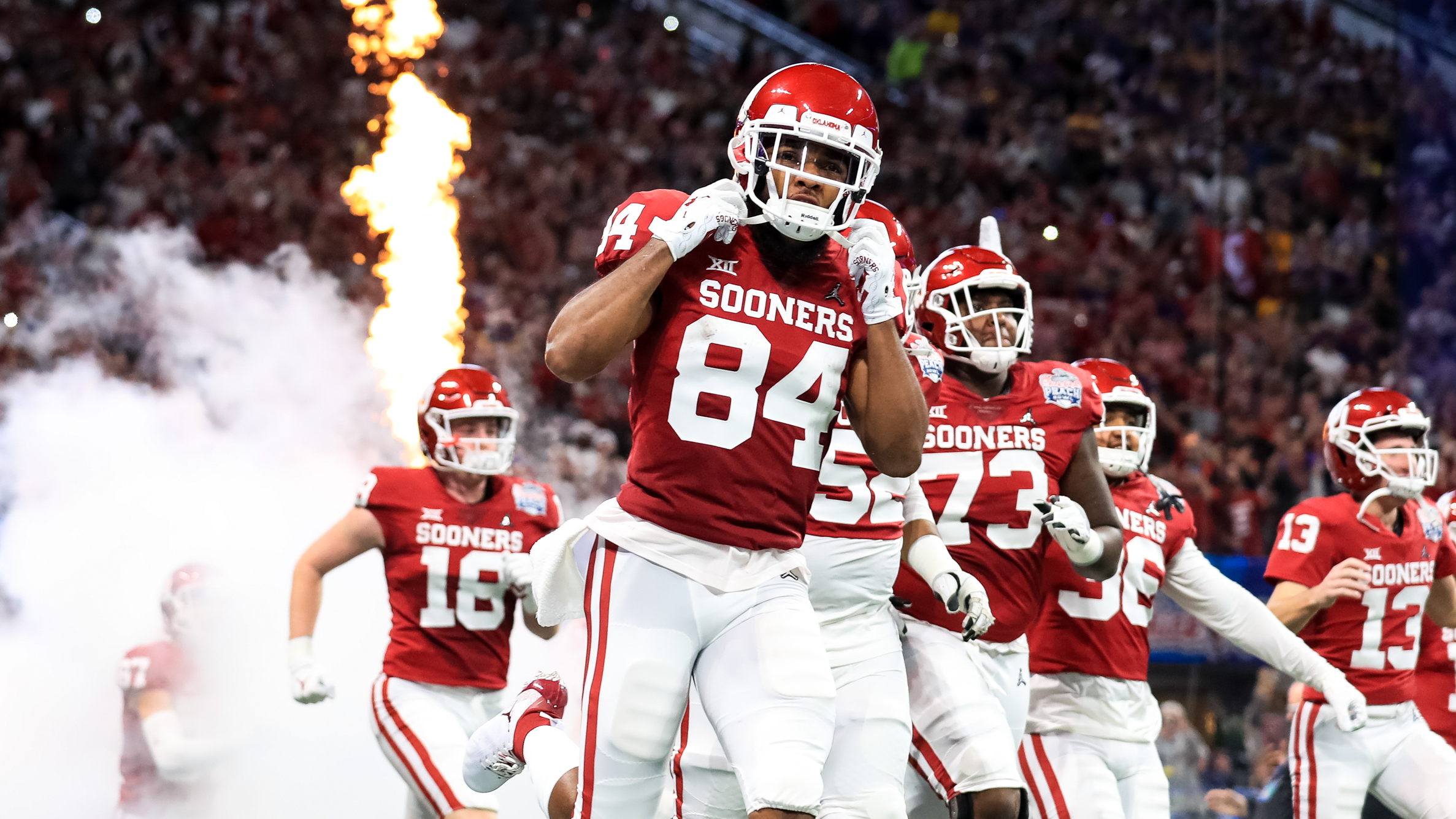Oklahoma Sports Betting Still Unlikely After Tribes’ Compact Decision
Carmen Mandato/Getty Images. Pictured: The Oklahoma football team at the 2019 Chik-fil-A Peach Bowl.
Oklahoma sports betting is no closer to reality after two tribes announced they would still adhere to gaming compacts the state supreme court invalidated last month. Though two tribes technically are allowed to open sportsbooks in deals struck with the governor earlier this year, officials are holding off until state lawmakers change existing statutes, the Oklahoman reported.
That means the Comanche Nation and Otoe-Missouria Tribes’ decision to honor new compacts struck in 2020 instead of the previous deal agreed to in 2005 seems, for now, to push Oklahoma no closer to legal sports betting. It will further cloud what has already been a long, complex and, at times, bitter discussion over the future of the nation’s second-largest largest tribal gaming market.
“I know they want to try sports betting,” said Kevin Slicker, managing partner at Tulsa-based GP Gaming Consultants, “but I don’t know how they’re going to pull it off."
Oklahoma Gaming Background
In 2004, Oklahoma voters approved federally recognized tribes’ authority to offer certain types of casino games on sovereign lands. By 2016, Oklahoma tribes had generated nearly $10 billion in annual economic output and roughly 75,000 jobs across 131 gaming facilities, trailing only California as the nation’s highest-grossing tribal gaming state.
After taking office in 2019, Governor Kevin Stitt sought to renegotiate the original compact struck in 2005 with a deal that imposed higher fees on gaming revenues. In exchange for the exclusive rights to offer “Las Vegas-style” casino games, Oklahoma tribes pay six percent of net gaming revenues exceeding $20 million. Similar fees in other states range from as little as zero percent to as much as 25 percent of gross gaming revenue.
The governor argued the original compact would expire at the end of 2019 and tribes would be legally forced to shut their casinos without a new deal. The tribes said language in the 2005 deal meant it auto-renewed in absence of a replacement compact and kept their doors open at the start of the new year.
As legal battles ratcheted up over the legality of the original compact, the governor began negotiating new agreements with individual groups, instead of the initial deal that covered all tribes. In April, the Comanche and Otoe-Missouria announced the first two such compacts, which would allow them to open additional gaming facilities as well as the state’s first-ever sportsbooks in exchange for higher gaming revenue fees.
Ensuing legal challenges dealt Stitt and the two new gaming compact signatories multiple blows.
The Oklahoma Supreme Court sided in a lawsuit brought by Stitt’s fellow Republicans, ruling the governor didn’t have the authority to grant the tribes a new compact that permitted sports betting since sports wagering hadn’t been approved by the legislature. In a separate ruling announced days later, a federal court determined the original 2005 compact renewed automatically, denying Stitt his largest bargaining chip for a new compact.
“The state has zero negotiating power,” Slicker said. “They have to take what they’re given now.”
Status of Oklahoma Tribal Gaming
In September, the Comanche and Otoe-Missouria announced they would abide by the new compacts, arguing only a federal court could void the deals.
It remains to be seen if any federal courts will take up the case. Earlier this year, the Supreme Court ruled much of eastern Oklahoma was technically still subject to a 20th-century treaty that granted tribes certain legal autonomy, but officials believe that has little impact on tribal gaming, let alone questions surrounding the two compacts.
However, it appears the tribes will adhere to the court’s decision that Stitt was not permitted to authorize sports betting without an act of the Oklahoma Legislature. Lawmakers aren’t set to return until the 2021 legislative session begins in February, and sports betting is just one of a myriad of gaming issues they will have to tackle next year.
In the meantime, the state's 30 additional gaming tribes are content to carry on the original compact. Sports betting would undoubtedly boost revenues, but as one of the historically lower-margin, lower-grossing gaming offerings, tribes are in no rush for legal wagering if it jeopardizes the overall benefits of their existing compact.
Larger tribes such as the Choctaw, Cherokee and Chickasaw, which make up the bulk of the state’s tribal gaming revenues, have the financial stability to wait for a new deal — or a new governor. For smaller tribes such as the Comanche and Otoe-Missouria, a new compact with more gaming facilities and game options may be worth the legal and logistical headaches.
“Some of the smaller tribes don’t have the same resources as the larger tribes, so I get what they’re trying to do,” Slicker said. “They have different needs and priorities.”
Earlier this year it appeared Oklahoma had legalized sports betting and that either the Comanche or Otoe-Missouria would open the state’s first sportsbook. Subsequent legal battles had derailed this path for now, and the pair’s decision to abide by compacts struck down by state courts means the time or legality of the first legal bet is likely far from settled.
How would you rate this article?
